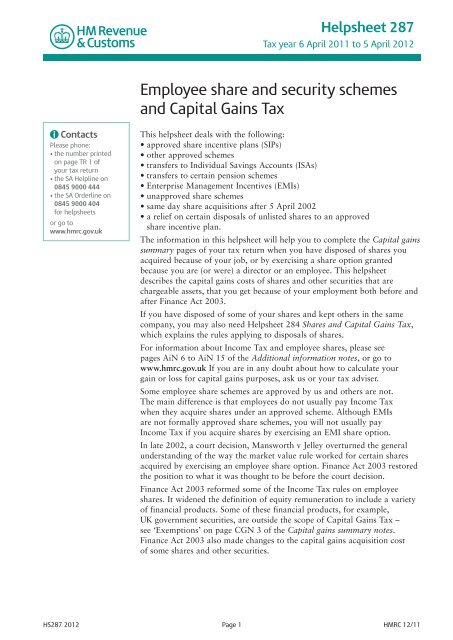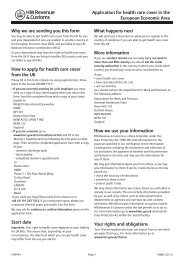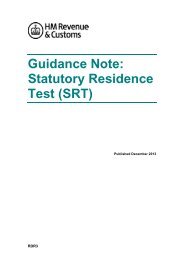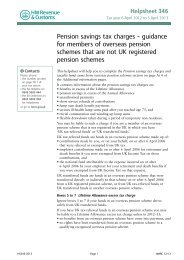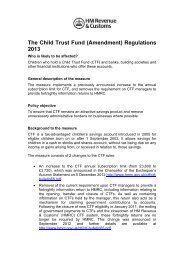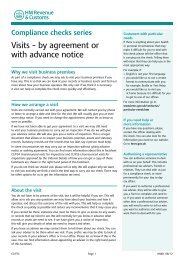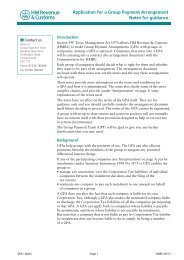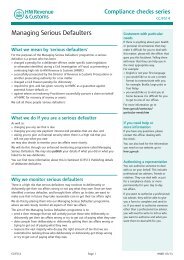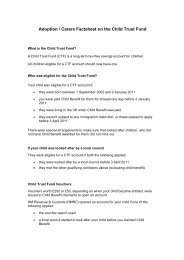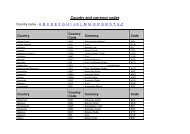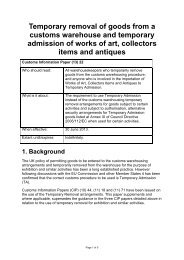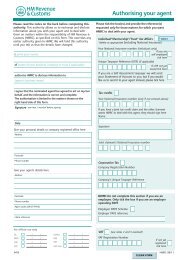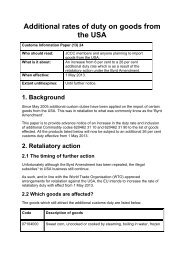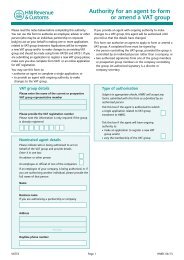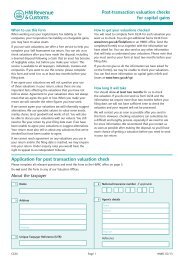Employee share and security schemes and Capital Gains Tax
Employee share and security schemes and Capital Gains Tax
Employee share and security schemes and Capital Gains Tax
Create successful ePaper yourself
Turn your PDF publications into a flip-book with our unique Google optimized e-Paper software.
A Contacts<br />
Please phone:<br />
• the number printed<br />
on page TR 1 of<br />
your tax return<br />
• the SA Helpline on<br />
0845 9000 444<br />
• the SA Orderline on<br />
0845 9000 404<br />
for helpsheets<br />
or go to<br />
www.hmrc.gov.uk<br />
Helpsheet 287<br />
<strong>Tax</strong> year 6 April 2011 to 5 April 2012<br />
<strong>Employee</strong> <strong>share</strong> <strong>and</strong> <strong>security</strong> <strong>schemes</strong><br />
<strong>and</strong> <strong>Capital</strong> <strong>Gains</strong> <strong>Tax</strong><br />
This helpsheet deals with the following:<br />
• approved <strong>share</strong> incentive plans (SIPs)<br />
• other approved <strong>schemes</strong><br />
• transfers to Individual Savings Accounts (ISAs)<br />
• transfers to certain pension <strong>schemes</strong><br />
• Enterprise Management Incentives (EMIs)<br />
• unapproved <strong>share</strong> <strong>schemes</strong><br />
• same day <strong>share</strong> acquisitions after 5 April 2002<br />
• a relief on certain disposals of unlisted <strong>share</strong>s to an approved<br />
<strong>share</strong> incentive plan.<br />
The information in this helpsheet will help you to complete the <strong>Capital</strong> gains<br />
summary pages of your tax return when you have disposed of <strong>share</strong>s you<br />
acquired because of your job, or by exercising a <strong>share</strong> option granted<br />
because you are (or were) a director or an employee. This helpsheet<br />
describes the capital gains costs of <strong>share</strong>s <strong>and</strong> other securities that are<br />
chargeable assets, that you get because of your employment both before <strong>and</strong><br />
after Finance Act 2003.<br />
If you have disposed of some of your <strong>share</strong>s <strong>and</strong> kept others in the same<br />
company, you may also need Helpsheet 284 Shares <strong>and</strong> <strong>Capital</strong> <strong>Gains</strong> <strong>Tax</strong>,<br />
which explains the rules applying to disposals of <strong>share</strong>s.<br />
For information about Income <strong>Tax</strong> <strong>and</strong> employee <strong>share</strong>s, please see<br />
pages AiN 6 to AiN 15 of the Additional information notes, or go to<br />
www.hmrc.gov.uk If you are in any doubt about how to calculate your<br />
gain or loss for capital gains purposes, ask us or your tax adviser.<br />
Some employee <strong>share</strong> <strong>schemes</strong> are approved by us <strong>and</strong> others are not.<br />
The main difference is that employees do not usually pay Income <strong>Tax</strong><br />
when they acquire <strong>share</strong>s under an approved scheme. Although EMIs<br />
are not formally approved <strong>share</strong> <strong>schemes</strong>, you will not usually pay<br />
Income <strong>Tax</strong> if you acquire <strong>share</strong>s by exercising an EMI <strong>share</strong> option.<br />
In late 2002, a court decision, Mansworth v Jelley overturned the general<br />
underst<strong>and</strong>ing of the way the market value rule worked for certain <strong>share</strong>s<br />
acquired by exercising an employee <strong>share</strong> option. Finance Act 2003 restored<br />
the position to what it was thought to be before the court decision.<br />
Finance Act 2003 reformed some of the Income <strong>Tax</strong> rules on employee<br />
<strong>share</strong>s. It widened the definition of equity remuneration to include a variety<br />
of financial products. Some of these financial products, for example,<br />
UK government securities, are outside the scope of <strong>Capital</strong> <strong>Gains</strong> <strong>Tax</strong> –<br />
see ‘Exemptions’ on page CGN 3 of the <strong>Capital</strong> gains summary notes.<br />
Finance Act 2003 also made changes to the capital gains acquisition cost<br />
of some <strong>share</strong>s <strong>and</strong> other securities.<br />
HS287 2012 Page 1 HMRC 12/11
Approved <strong>share</strong> incentive plans (SIPs)<br />
HS287 2012 Page 2<br />
If you keep your <strong>share</strong>s in the SIP until you dispose of them, you<br />
will have no <strong>Capital</strong> <strong>Gains</strong> <strong>Tax</strong> to pay in respect of this disposal.<br />
If you keep the <strong>share</strong>s after you take them out of the plan <strong>and</strong> dispose<br />
of them later, your cost for capital gains purposes will be their market<br />
value on the date the <strong>share</strong>s leave the plan.<br />
Approved profit-sharing scheme<br />
For capital gains purposes:<br />
• the cost of your <strong>share</strong>s is their market value when the trustees of the<br />
scheme allocate them to you. The trustees will tell you what this is<br />
• you acquire your <strong>share</strong>s when the trustees allocate them to you<br />
(even though you cannot dispose of them freely at that time).<br />
Approved savings-related <strong>share</strong> option <strong>schemes</strong> (SAYE <strong>schemes</strong>)<br />
The capital gains cost of your <strong>share</strong>s is usually what you pay for them<br />
when you exercise your option. Where exceptionally you pay Income <strong>Tax</strong><br />
on the exercise of your option, the amount chargeable to Income <strong>Tax</strong><br />
forms part of the cost of your <strong>share</strong>s. If you exercised your option before<br />
10 April 2003, the cost of your <strong>share</strong>s is the market value of the <strong>share</strong>s<br />
at the time you exercised the option.<br />
Individual Savings Accounts (ISAs)<br />
In the tax year to 5 April 2012, you could transfer <strong>share</strong>s worth up to<br />
£10,680 at the date of transfer into an ISA directly from a SIP,<br />
an approved profit-sharing scheme or a SAYE scheme, providing<br />
certain conditions were met. If you transferred your <strong>share</strong>s to an ISA,<br />
no <strong>Capital</strong> <strong>Gains</strong> <strong>Tax</strong> is payable on the transfer or on the later disposal<br />
of the <strong>share</strong>s in the ISA.<br />
For general information about ISAs, please see the ISA factsheet<br />
at www.hmrc.gov.uk<br />
Personal pension <strong>schemes</strong>/stakeholder pension <strong>schemes</strong><br />
In the tax year to 5 April 2012, you could transfer <strong>share</strong>s to some<br />
personal or stakeholder pension <strong>schemes</strong> from a SAYE scheme, an<br />
approved profit-sharing scheme or a SIP, providing certain conditions<br />
were met. You dispose of the <strong>share</strong>s you transfer, so if you make a gain<br />
you may be liable to <strong>Capital</strong> <strong>Gains</strong> <strong>Tax</strong>. Usually you will make a gain<br />
on your SAYE <strong>and</strong> approved profit-sharing scheme <strong>share</strong>s because you<br />
acquire them for less than the market value at the date of the transfer<br />
to your pension scheme. If you transfer <strong>share</strong>s directly from the SIP<br />
to your pension scheme you will not be liable to <strong>Capital</strong> <strong>Gains</strong> <strong>Tax</strong>.<br />
But if you take the <strong>share</strong>s out of the plan <strong>and</strong> transfer them later,<br />
but within the 90-day limit, you may make a capital gain.<br />
Company <strong>share</strong> option plans (CSOPs)<br />
The capital gains cost of your <strong>share</strong>s is usually what you pay for<br />
them when you exercise your option. Where exceptionally you pay<br />
Income <strong>Tax</strong> on the exercise of your option, the amount chargeable
A Contacts<br />
Please phone:<br />
• the number printed<br />
on page TR 1 of<br />
your tax return<br />
• the SA Helpline on<br />
0845 9000 444<br />
• the SA Orderline on<br />
0845 9000 404<br />
for helpsheets<br />
or go to<br />
www.hmrc.gov.uk<br />
to Income <strong>Tax</strong> forms part of the cost of your <strong>share</strong>s. If you exercised your<br />
option before 10 April 2003, the cost of your <strong>share</strong>s is the market value<br />
of the <strong>share</strong>s at the time you exercised the option.<br />
Enterprise Management Incentives (EMIs)<br />
If you exercised your EMI option before 10 April 2003, the capital gains cost<br />
of your <strong>share</strong>s is their market value at the time you exercised the option.<br />
If you exercise your EMI option after 9 April 2003, the capital gains cost<br />
of your <strong>share</strong>s is what you pay for them together with the amount charged<br />
to Income <strong>Tax</strong>, if any, on the exercise of your option.<br />
Unapproved employee <strong>share</strong>/securities options<br />
If you exercised an unapproved <strong>share</strong> option before 10 April 2003,<br />
the capital gains cost of your <strong>share</strong>s is their market value at the time<br />
you exercised the option.<br />
If you exercise an unapproved <strong>share</strong> option after 9 April 2003, the capital<br />
gains cost of your <strong>share</strong>s is the total of:<br />
• what you pay for the option (if anything)<br />
• the price you pay for the <strong>share</strong>s when you exercise the option, <strong>and</strong><br />
• the amount chargeable to Income <strong>Tax</strong> on the exercise.<br />
If, after 15 April 2003, you exercise an option over securities that are<br />
chargeable assets, but not <strong>share</strong>s, the capital gains cost of your securities<br />
is the total of:<br />
• what you pay for the option (if anything)<br />
• the price you pay for the securities when you exercise the option, <strong>and</strong><br />
• the amount chargeable to Income <strong>Tax</strong> on the exercise.<br />
All employee <strong>share</strong>/securities options<br />
You are generally treated for capital gains purposes as acquiring your <strong>share</strong>s<br />
at the date when you exercise your option.<br />
When you exercise your option, you may agree with your employer that<br />
you will pay part or all of your employer’s National Insurance contribution<br />
if any is due. You can claim Income <strong>Tax</strong> relief for this payment. The amount<br />
on which you get Income <strong>Tax</strong> relief does not reduce the cost of your <strong>share</strong>s<br />
for capital gains purposes.<br />
If you release your option in consideration of the grant of a new <strong>share</strong> option,<br />
<strong>and</strong> do not receive anything else, you will not be liable to <strong>Capital</strong> <strong>Gains</strong> <strong>Tax</strong><br />
on receipt of the new option. You may be liable to <strong>Capital</strong> <strong>Gains</strong> <strong>Tax</strong> if you<br />
receive something else, as well as the new <strong>share</strong> option <strong>and</strong> you do not pay<br />
Income <strong>Tax</strong> on whatever else you receive.<br />
If you do not exercise an option <strong>and</strong> it lapses you do not make an allowable<br />
loss for capital gains purposes.<br />
Unapproved employee <strong>share</strong>/securities <strong>schemes</strong><br />
If, because of your job, you acquire free or cheap <strong>share</strong>s or other securities<br />
outside an approved <strong>share</strong> scheme <strong>and</strong> not by exercising a <strong>share</strong> option,<br />
the capital gains cost is generally their market value at the date you acquire<br />
them. For <strong>share</strong>s acquired before 16 April 2003, the main exception to this<br />
rule is where you got <strong>share</strong>s subject to the risk of forfeiture <strong>and</strong> pay<br />
HS287 2012 Page 3
HS287 2012 Page 4<br />
Income <strong>Tax</strong> only when the risk is lifted or when you dispose of<br />
the <strong>share</strong>s. Finance Act 2003 made further exceptions from the rule.<br />
The table below sets out the capital gains costs of some <strong>share</strong>s <strong>and</strong> other<br />
securities that Finance Act 2003 affected.<br />
Shares or securities Acquired before 1 Sep 2003 Acquired after 31 Aug 2003<br />
Shares subject to risk Actual cost plus amount Actual cost plus amounts,<br />
of forfeiture for charged to Income <strong>Tax</strong> if any, charged to Income <strong>Tax</strong><br />
five years or less on removal of risk or on acquisition, variation,<br />
on disposal subject to risk removal of risk or on<br />
disposal subject to risk<br />
Shares subject to Market value subject to Actual cost plus amounts,<br />
restrictions other the restrictions plus amount, if any, charged to Income <strong>Tax</strong><br />
than risk above if any, charged to Income <strong>Tax</strong> on acquisition, variation,<br />
after acquisition removal of risk or on<br />
disposal subject to risk<br />
Securities other than Market value subject to Actual cost plus amounts<br />
<strong>share</strong>s subject to the restrictions if any, charged to Income <strong>Tax</strong><br />
restrictions, that are on acquisition, variation,<br />
chargeable assets removal of risk or on<br />
disposal subject to risk<br />
Convertible <strong>share</strong>s Market value plus amount Actual cost plus amounts<br />
charged to Income <strong>Tax</strong> charged to Income <strong>Tax</strong> on<br />
on conversion acquisition <strong>and</strong> conversion<br />
Convertible securities Market value Actual cost plus amounts<br />
other than <strong>share</strong>s that charged to Income <strong>Tax</strong> on<br />
are chargeable assets acquisition <strong>and</strong> conversion<br />
Shares subject to restrictions on disposal<br />
If, because of your job, you acquire <strong>share</strong>s which you cannot dispose<br />
of freely, for example, for three years after you receive them, these<br />
<strong>share</strong>s are treated as a separate class of <strong>share</strong>s from any other <strong>share</strong>s<br />
in the company that you hold until the restrictions are removed. So, if<br />
you hold other <strong>share</strong>s in the company <strong>and</strong> sell some of them, you will<br />
not be treated as selling the <strong>share</strong>s that you cannot dispose of freely.<br />
Same day <strong>share</strong> acquisitions after 5 April 2002<br />
Shares of the same class in the same company acquired on the same day<br />
are normally pooled. When you dispose of them you use the average cost<br />
per <strong>share</strong> in calculating any capital gain or loss. However, there is a rule<br />
that may help you to reduce your <strong>Capital</strong> <strong>Gains</strong> <strong>Tax</strong> liability when you<br />
dispose of <strong>share</strong>s acquired after 5 April 2002.<br />
You may elect to divide the <strong>share</strong>s you acquire on the same day into<br />
two categories. One category includes all the <strong>share</strong>s you acquire<br />
by exercising a qualifying EMI option <strong>and</strong> most <strong>share</strong>s that you acquire<br />
by exercising a SAYE or CSOP option. The other category includes<br />
any SAYE or CSOP <strong>share</strong>s where you pay Income <strong>Tax</strong> when you acquire<br />
them, <strong>and</strong> all other <strong>share</strong>s of the same class in the same company that<br />
you acquire on the same day. You treat <strong>share</strong>s in this other category<br />
as disposed of first. These <strong>share</strong>s that you treat as disposed of first will<br />
generally give rise to smaller gains.
A Contacts<br />
Please phone:<br />
• the number printed<br />
on page TR 1 of<br />
your tax return<br />
• the SA Helpline on<br />
0845 9000 444<br />
• the SA Orderline on<br />
0845 9000 404<br />
for helpsheets<br />
or go to<br />
www.hmrc.gov.uk<br />
This election applies only to <strong>share</strong>s acquired on the same day. It overrides<br />
the normal rules. You will need to consider your individual circumstances<br />
to decide whether or not to elect.<br />
When can you elect?<br />
You can make the election after you dispose of <strong>share</strong>s you acquired after<br />
5 April 2002. You must make the election within one year <strong>and</strong> 10 months<br />
after the end of the tax year in which you first dispose of some of the <strong>share</strong>s<br />
acquired on the same day – for the year ended 5 April 2012 by<br />
31 January 2014. The election applies to all the <strong>share</strong>s of the same class<br />
in the same company acquired on one day. It applies to the first <strong>and</strong> all<br />
subsequent disposals of these <strong>share</strong>s.<br />
How you elect<br />
There is no special form. Explain that you are making a ‘same day<br />
acquisition’ election. Provide:<br />
• the date you acquired the <strong>share</strong>s<br />
• the name of the company<br />
• the total number, class <strong>and</strong> cost or value of <strong>share</strong>s you acquired<br />
on the same day<br />
• the number <strong>and</strong> cost of <strong>share</strong>s you acquired in the category treated<br />
as disposed of after other <strong>share</strong>s acquired by exercising<br />
– a qualifying EMI option<br />
– a SAYE option where you paid no Income <strong>Tax</strong>, <strong>and</strong><br />
– a CSOP option where you paid no Income <strong>Tax</strong><br />
• the date, number of <strong>share</strong>s disposed of <strong>and</strong> the proceeds of your first<br />
disposal of some of the <strong>share</strong>s acquired on the same day.<br />
If, before the time limit is up, you make a return showing the first disposal<br />
of <strong>share</strong>s <strong>and</strong> you want to make an election, include it in that return.<br />
Enter the information about the disposal of <strong>share</strong>s in the <strong>Capital</strong> gains<br />
summary pages. Enter ‘same day acquisition election’ in your computations<br />
next to that disposal <strong>and</strong> include any additional details in the ‘Any other<br />
information box’, box 36, on page CG 2 or in the computations. Otherwise<br />
write to us. You should make reference to the election each time you dispose<br />
of any of the remaining <strong>share</strong>s.<br />
Relief on transfers of <strong>share</strong>s to an approved <strong>share</strong> incentive plan<br />
This relief is designed to encourage <strong>share</strong>holders disposing of their unlisted<br />
<strong>share</strong>s to sell them to the trustees of the company SIP for the benefit of all the<br />
employees of the company. You do not have to be an employee to claim it.<br />
Getting relief<br />
The conditions are:<br />
• the person disposing of the <strong>share</strong>s cannot be a company<br />
• the <strong>share</strong>s must be <strong>share</strong>s<br />
– that are not listed on a recognised stock exchange <strong>and</strong> not <strong>share</strong>s<br />
in a subsidiary of a listed company, <strong>and</strong><br />
– that may be held in the SIP<br />
• you have to dispose of <strong>share</strong>s to the trustees of a SIP<br />
• the trustees must have a minimum stake of 10% in the company<br />
HS287 2012 Page 5
• there must be no arrangement under which you can reacquire any<br />
of the <strong>share</strong>s, except as a participant in the SIP<br />
• you must acquire replacement assets, <strong>and</strong><br />
• you must claim the relief within two years from the date you acquire<br />
the replacement assets.<br />
Replacement assets are assets which are chargeable assets in your h<strong>and</strong>s<br />
at the time you acquire them, but are not <strong>share</strong>s in, or debentures issued by,<br />
the company or any company which is in the same worldwide group<br />
as the company.<br />
Relief available<br />
If you use the whole of the amount you receive from the disposal of the <strong>share</strong>s<br />
to acquire replacement assets then none of your gain will be taxed. Instead,<br />
you reduce the cost of the replacement asset by the amount of the gain.<br />
If you use part of the amount you receive from the disposal of the <strong>share</strong>s<br />
to acquire the replacement asset then you can defer part of your gain by<br />
deducting it from the cost of the replacement asset. This only applies where<br />
the amount you do not use to acquire the replacement asset is less than<br />
the amount of the gain.<br />
There is no relief if the amount that you do not reinvest in the replacement<br />
asset is more than the amount of the original gain.<br />
How to claim relief<br />
When you claim relief you must tell us about:<br />
• the <strong>share</strong>s you have disposed of<br />
• the amount you received<br />
• the date when you disposed of the <strong>share</strong>s<br />
• the name <strong>and</strong> address of the trustees of the SIP to whom you disposed<br />
of the <strong>share</strong>s<br />
• the replacement asset you have acquired<br />
• the date when you acquired it<br />
• its cost<br />
• the amount of disposal proceeds of the <strong>share</strong>s that you have used<br />
to acquire the replacement asset.<br />
Enter the information about the disposal of <strong>share</strong>s on the <strong>Capital</strong> gains<br />
summary pages. Enter ‘relief on disposal to <strong>share</strong> incentive plan’ <strong>and</strong> the<br />
amount claimed in your computations next to that disposal, <strong>and</strong> include any<br />
further details in box 36 on page CG 2 or in the computations about the SIP<br />
<strong>and</strong> the replacement assets. The disposal of the <strong>share</strong>s should be entered<br />
on the <strong>Capital</strong> gains summary pages but you may prefer to claim the relief<br />
at a later date.<br />
HS287 2012 Page 6<br />
These notes are for guidance only <strong>and</strong> reflect the position at the time of writing.<br />
They do not affect any rights of appeal. Any subsequent amendments to these notes<br />
can be found at www.hmrc.gov.uk


